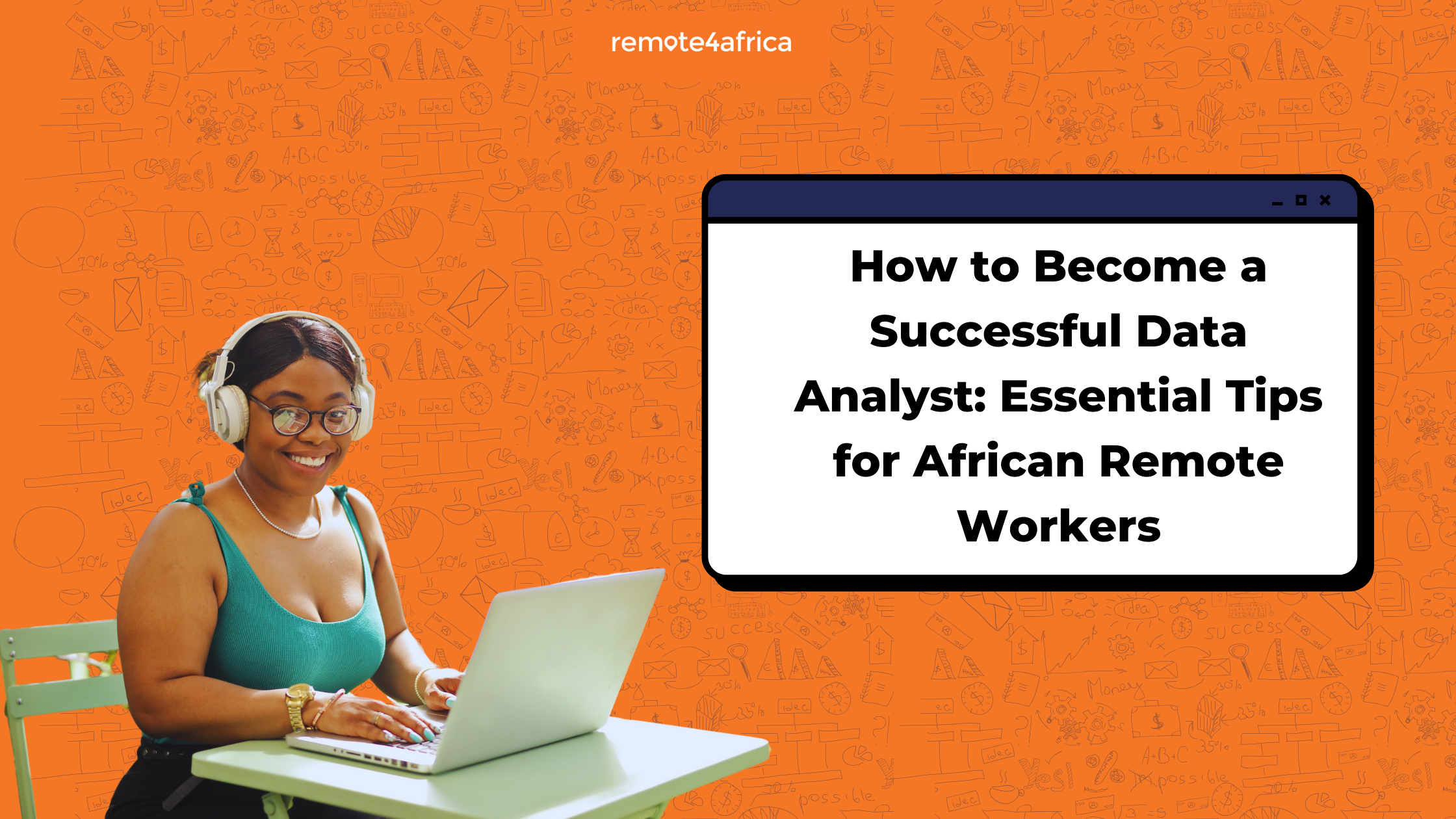How to Become a Successful Data Analyst: Essential Tips for African Remote Workers
Practical experience is key. Look for internships or freelance projects to build your skills. Websites like Remote4Africa offer job listings specifically for remote African workers.

The world is now run by data, becoming a data analyst is a promising career choice, especially for remote workers in Africa. The demand for data analysts is growing, with companies worldwide seeking professionals who can interpret complex data to inform business decisions. This article provides a comprehensive guide to help African remote workers embark on a successful data analysis career.
What is a Data Analyst?
A data analyst is a professional who collects, processes, and performs statistical analyses on data. They help organizations make informed decisions by interpreting data and providing actionable insights. Key responsibilities include data cleaning, data visualization, and creating reports.
Why Data Analysis is a Great Career
Data analysis offers robust job prospects and attractive salaries. As businesses increasingly rely on data for strategic decisions, the demand for skilled data analysts continues to rise. Remote work opportunities also make it accessible to professionals across Africa, enabling them to work for global companies.
Skills Required to Become a Data Analyst
Technical Skills
- Programming: Proficiency in SQL, Python, or R.
- Statistics: Understanding of statistical methods and data interpretation.
- Data Visualization: Skills in tools like Tableau, Power BI, or Excel.
Soft Skills
- Analytical Thinking: Ability to think critically and solve problems.
- Communication: Effectively convey complex data insights to non-technical stakeholders.
- Attention to Detail: Ensuring data accuracy and reliability.
Educational Background
While a degree in a related field such as mathematics, statistics, computer science, or economics is beneficial, it's not always necessary. Many successful data analysts come from diverse educational backgrounds and rely on certifications and self-study to build their skills.
Learning Pathways
Online Courses
- Coursera: Offers comprehensive courses from top universities.
- edX: Provides access to courses from institutions like Harvard and MIT.
- Khan Academy: Free courses on statistics and data analysis.
Bootcamps
- DataCamp: Hands-on learning with real-world datasets.
- General Assembly: Intensive bootcamps to fast-track your career.
Essential Tools for Data Analysts
Familiarity with certain tools is crucial for a data analyst. Here are some of the most commonly used:
- Excel: Fundamental tool for data analysis.
- SQL: Essential for database management.
- Python/R: Programming languages for advanced data analysis.
- Tableau/Power BI: For data visualization and creating interactive dashboards.
Getting Hands-On Experience
Practical experience is key. Look for internships or freelance projects to build your skills. Websites like Remote4Africa offer job listings specifically for remote African workers.
Building a Portfolio
Create a portfolio to showcase your projects and skills. Include case studies, data visualizations, and any relevant work. Having an online presence, such as a personal website or a LinkedIn profile, can significantly enhance your job prospects.
Networking and Mentorship
Connecting with professionals in the field can open doors to new opportunities. Join online forums, attend virtual meetups, and seek out mentors who can provide guidance and support.
Remote Work Opportunities
With the rise of remote work, data analysts can work from anywhere. Utilize platforms like LinkedIn, Upwork, and Remote OK to find remote data analysis jobs.
Preparing for Interviews
Prepare for interviews by practicing common questions and refining your technical skills. Demonstrating your ability to solve real-world problems with data is crucial.
Continuous Learning and Development
The field of data analysis is constantly evolving. Stay updated with the latest tools and techniques by taking advanced courses and attending webinars. Here are skills required to get a remote data analysis job.
Challenges and How to Overcome Them
Common challenges include keeping up with technological advancements and dealing with complex data sets. Continuous learning and practical experience can help overcome these obstacles.
Resources for African Remote Workers
There are numerous free resources available for aspiring data analysts. Here are some recommendations:
- Kaggle: Free datasets and competitions to practice your skills.
- Coursera and edX: Offer financial aid for many of their courses.
- Local Scholarships: Many organizations offer scholarships to African students.
- Remote4Africa: Remote4Africa for more information on remote work opportunities and resources tailored for African remote workers.
Conclusion
Embarking on a career as a data analyst offers numerous opportunities for growth and success, especially for remote workers in Africa. By acquiring the necessary skills, building a strong portfolio, and leveraging available resources, you can make a significant impact in the data-driven world.
FAQs
How long does it take to become a data analyst? The timeline varies depending on your current skill level and the time you can dedicate to learning. On average, it can take six months to two years.
Do I need a degree to become a data analyst? While a degree can be helpful, it's not always necessary. Many successful data analysts have built their careers through certifications and self-study.
What is the average salary of a data analyst? Salaries vary by location and experience, but entry-level data analysts can expect to earn between $50,000 to $70,000 per year.
What are some free resources to learn data analysis? Kaggle, Coursera, edX, and Khan Academy offer free courses and resources to help you get started.
Can I work as a data analyst remotely? Yes, many companies offer remote data analysis positions, allowing you to work from anywhere.
What are the most important skills for a data analyst? Key skills include programming (SQL, Python/R), data visualization, statistical analysis, and strong communication abilities.
